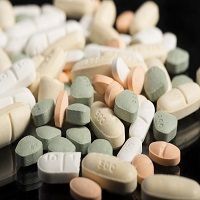Article
NSAIDs: Preventing Colon Cancer by Killing Mutated Intestinal Cells
Author(s):
A recent study led by researchers at the University of Pittsburgh Cancer Institute (UPCI) and the School of Medicine has shown that aspirin and other nonsteroidal anti-inflammatory drugs (NSAIDs) protect against the development of colorectal cancer through cell suicide pathway induction in intestinal stem cells that carry a certain mutated gene.

A recent study led by researchers at the University of Pittsburgh Cancer Institute (UPCI) and the School of Medicine has shown that aspirin and other nonsteroidal anti-inflammatory drugs (NSAIDs) protect against the development of colorectal cancer through cell suicide pathway induction in intestinal stem cells that carry a certain mutated gene.
According to study results published online in Proceedings of the National Academy of Sciences, Lin Zhang, PhD, associate professor, Department of Pharmacology and Chemical Biology, Pittsburgh School of Medicine, UPCI, and his team conducted animal model experiments that allowed for observation of tumor samples from patients who had taken NSAIDs and those who had not.
While it’s long been understood that NSAIDs like aspirin and ibuprofen successfully curb the risk of intestinal polyp development, scientists had never been able to identify its true underlying cause.
The authors discovered that NSAIDs stimulate the death receptor pathway, which selectively activates a suicide program within intestinal stem cells that have a mutation in the APC gene, resulting in completely dysfunctional cells. Since healthy cells are free from mutation, they are safe from any NSAIDs-induced harm. This, in turn, spurs auto-destruction of cells earlier on in the process that could potentially lead to precancerous polyps and tumors.
“Our study identifies a biochemical mechanism that could explain how this preventable effect occurs. These findings could help us design new drugs to prevent colorectal cancer, which is the third leading cause of cancer-related deaths in the country,”said Zhang.
These results suggested NSAIDs subdue intestinal tumorigenesis through BID-mediated synthetic lethality, offering “a rationale for developing more effective cancer prevention strategies and agents”.
According to Zhang, “We want to use our new understanding of this mechanism as a starting point to design better drugs and effective cancer prevention strategies for those at a high risk of colon cancer. Ideally, we could harness the tumor-killing traits of NSAIDs and avoid possible side effects that can occur with their chronic use, such as gastrointestinal bleeding and ulcers.”




